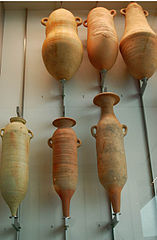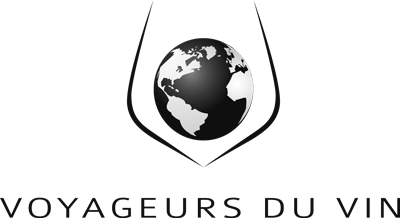Since a few decades, Lebanon is known for being a small producer which makes surprising high quality wines.
HISTORY OF THE WINE IN LEBANON
 Phoenician amphoras.
Phoenician amphoras.
The contemporary historians make Lebanon the birth place of wine with traces dating as far back as 7000 years B.C. Thousand years Before Christ, Phoenicians were making wines in Lebanon to export towards the great Mediterranean Civilizations like Egypt. During the Middle Age, Lebanon was famous in all Europa for it’s sought after wines. But when this country was under the Ottoman Empire viticulture was forbidden except for religious reasons. It allowed the Christians- Maronite and Greek and Armenian Orthodox- to keep making wine.
During the nineteenth century, the missionaries from French Algeria brought with them the modern viticultural technologies which is still used to produce the modern Lebanese wine.
During the twentieth century, the demand in wine shot up with the country under French mandate. After its independence, Lebanon was in a glorious economic period which led to the development of the wine sector. But the lengthy civil war slowed down the wine industry's progression.
With the current peace Lebanese viticulture has the opportunity to rise again. Lebanon is deeply influenced by Old World and French wine culture. These days the country produces seven billions of wine bottles per year with only 5000 acres of vines and thirty wine estates.
Main grapes Of Lebanon
The French influence show through the use of grape varieties in Lebanese wines. The most common red grapes are Cinsaut, Carignan, Cabernet Sauvignon, Merlot and Syrah and the most important white varieties are Chardonnay, Sauvignon Blanc and Clairette.
Lebanon Wine Regions
Bekaa Valley is Lebanon's main wine-growing region and could be wine's birthplace. It is the center for the development of Lebanese modern wine and produces roughly 90% of the country's wine.
The vineyards inside Bekaa Valley are on a plateau at 1000 meters of altitude. They enjoy an ideal micro-climate of warm summers, cool nights and low rainfall. The plateau is protected against winds by the surrounding mountains which bring water to the vineyards.
The high quality red wines from Bekaa Valley have strong similarities to the Bordeaux wines.
Château Ksara, Château Musar, Ixsir and Massaya are Bekaa Valley’s main wine estates.
